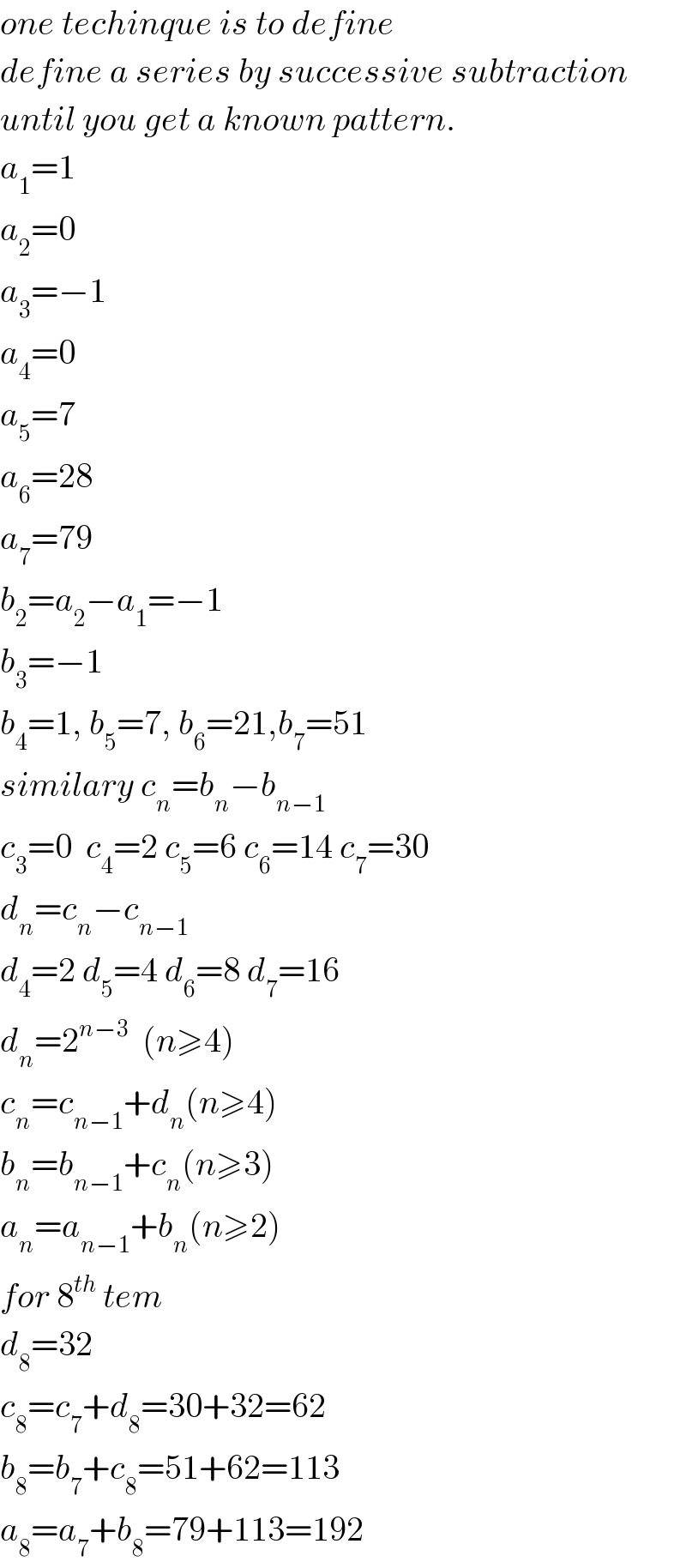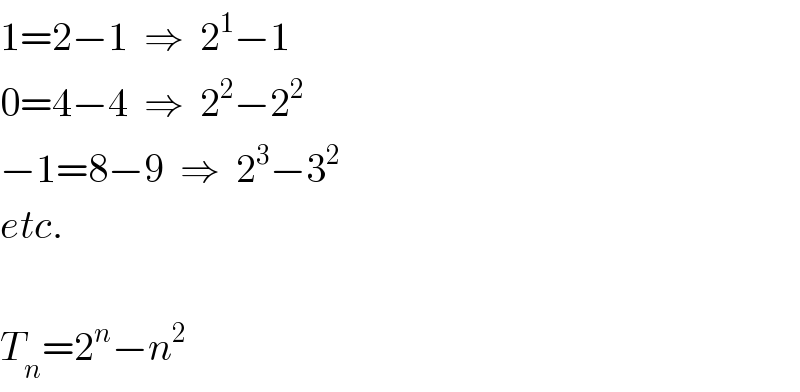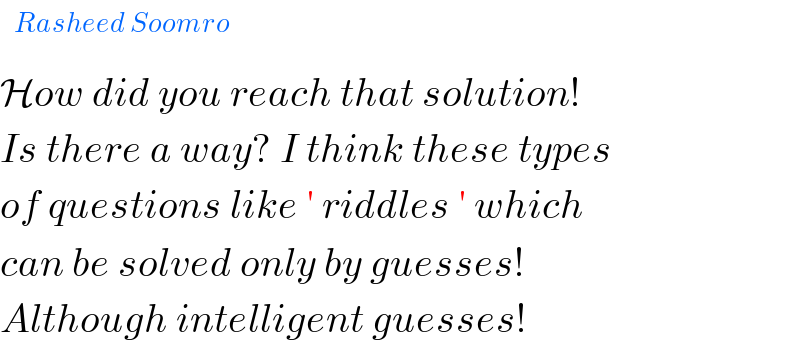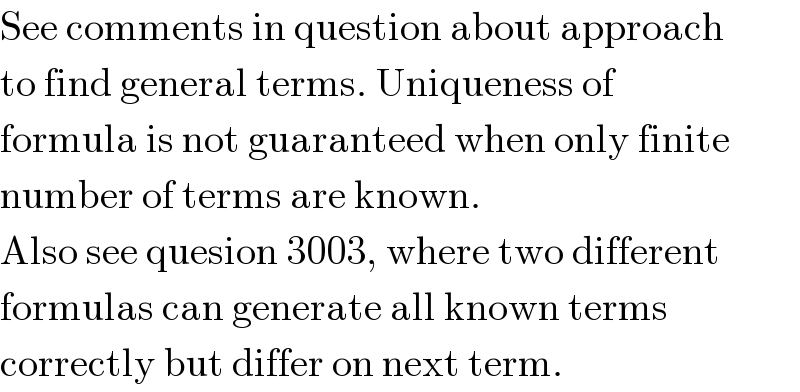
Question Number 3061 by Rasheed Soomro last updated on 04/Dec/15

$$\mathrm{Determine}\:\:\mathrm{nth}\:\:\mathrm{term}\:\mathrm{of}\:\mathrm{the}\:\mathrm{following}\:\mathrm{sequence} \\ $$$$\mathrm{1},\mathrm{0},−\mathrm{1},\mathrm{0},\mathrm{7},\mathrm{28},\mathrm{79},... \\ $$
Commented by prakash jain last updated on 04/Dec/15

$${one}\:{techinque}\:{is}\:{to}\:{define} \\ $$$${define}\:{a}\:{series}\:{by}\:{successive}\:{subtraction} \\ $$$${until}\:{you}\:{get}\:{a}\:{known}\:{pattern}. \\ $$$${a}_{\mathrm{1}} =\mathrm{1} \\ $$$${a}_{\mathrm{2}} =\mathrm{0} \\ $$$${a}_{\mathrm{3}} =−\mathrm{1} \\ $$$${a}_{\mathrm{4}} =\mathrm{0} \\ $$$${a}_{\mathrm{5}} =\mathrm{7} \\ $$$${a}_{\mathrm{6}} =\mathrm{28} \\ $$$${a}_{\mathrm{7}} =\mathrm{79} \\ $$$${b}_{\mathrm{2}} ={a}_{\mathrm{2}} −{a}_{\mathrm{1}} =−\mathrm{1} \\ $$$${b}_{\mathrm{3}} =−\mathrm{1} \\ $$$${b}_{\mathrm{4}} =\mathrm{1},\:{b}_{\mathrm{5}} =\mathrm{7},\:{b}_{\mathrm{6}} =\mathrm{21},{b}_{\mathrm{7}} =\mathrm{51} \\ $$$${similary}\:{c}_{{n}} ={b}_{{n}} −{b}_{{n}−\mathrm{1}} \\ $$$${c}_{\mathrm{3}} =\mathrm{0}\:\:{c}_{\mathrm{4}} =\mathrm{2}\:{c}_{\mathrm{5}} =\mathrm{6}\:{c}_{\mathrm{6}} =\mathrm{14}\:{c}_{\mathrm{7}} =\mathrm{30} \\ $$$${d}_{{n}} ={c}_{{n}} −{c}_{{n}−\mathrm{1}} \\ $$$${d}_{\mathrm{4}} =\mathrm{2}\:{d}_{\mathrm{5}} =\mathrm{4}\:{d}_{\mathrm{6}} =\mathrm{8}\:{d}_{\mathrm{7}} =\mathrm{16} \\ $$$${d}_{{n}} =\mathrm{2}^{{n}−\mathrm{3}} \:\:\left({n}\geqslant\mathrm{4}\right) \\ $$$${c}_{{n}} ={c}_{{n}−\mathrm{1}} +{d}_{{n}} \left({n}\geqslant\mathrm{4}\right) \\ $$$${b}_{{n}} ={b}_{{n}−\mathrm{1}} +{c}_{{n}} \left({n}\geqslant\mathrm{3}\right) \\ $$$${a}_{{n}} ={a}_{{n}−\mathrm{1}} +{b}_{{n}} \left({n}\geqslant\mathrm{2}\right) \\ $$$${for}\:\mathrm{8}^{{th}} \:{tem} \\ $$$${d}_{\mathrm{8}} =\mathrm{32} \\ $$$${c}_{\mathrm{8}} ={c}_{\mathrm{7}} +{d}_{\mathrm{8}} =\mathrm{30}+\mathrm{32}=\mathrm{62} \\ $$$${b}_{\mathrm{8}} ={b}_{\mathrm{7}} +{c}_{\mathrm{8}} =\mathrm{51}+\mathrm{62}=\mathrm{113} \\ $$$${a}_{\mathrm{8}} ={a}_{\mathrm{7}} +{b}_{\mathrm{8}} =\mathrm{79}+\mathrm{113}=\mathrm{192} \\ $$
Commented by Rasheed Soomro last updated on 05/Dec/15

$$\mathcal{TH}{ank}\mathcal{S}\:\:\:^{{for}} \:\:\:\overset{\mathcal{V}{alueable}} {\mathcal{G}{uidance}}\:! \\ $$
Answered by Filup last updated on 04/Dec/15

$$\mathrm{1}=\mathrm{2}−\mathrm{1}\:\:\Rightarrow\:\:\mathrm{2}^{\mathrm{1}} −\mathrm{1} \\ $$$$\mathrm{0}=\mathrm{4}−\mathrm{4}\:\:\Rightarrow\:\:\mathrm{2}^{\mathrm{2}} −\mathrm{2}^{\mathrm{2}} \\ $$$$−\mathrm{1}=\mathrm{8}−\mathrm{9}\:\:\Rightarrow\:\:\mathrm{2}^{\mathrm{3}} −\mathrm{3}^{\mathrm{2}} \\ $$$${etc}. \\ $$$$ \\ $$$${T}_{{n}} =\mathrm{2}^{{n}} −{n}^{\mathrm{2}} \\ $$
Commented by Rasheed Soomro last updated on 04/Dec/15

$$\mathcal{V}\:^{{ery}\:} \mathcal{G}^{\mathcal{OO}} \mathcal{D}! \\ $$
Commented by RasheedAhmad last updated on 04/Dec/15

$$ \\ $$$$\mathcal{H}{ow}\:{did}\:{you}\:{reach}\:{that}\:{solution}! \\ $$$${Is}\:{there}\:{a}\:{way}?\:{I}\:{think}\:{these}\:{types} \\ $$$${of}\:{questions}\:{like}\:'\:{riddles}\:'\:{which} \\ $$$${can}\:{be}\:{solved}\:{only}\:{by}\:{guesses}!\: \\ $$$${Although}\:{intelligent}\:{guesses}! \\ $$
Commented by prakash jain last updated on 04/Dec/15

$$\mathrm{See}\:\mathrm{comments}\:\mathrm{in}\:\mathrm{question}\:\mathrm{about}\:\mathrm{approach} \\ $$$$\mathrm{to}\:\mathrm{find}\:\mathrm{general}\:\mathrm{terms}.\:\mathrm{Uniqueness}\:\mathrm{of} \\ $$$$\mathrm{formula}\:\mathrm{is}\:\mathrm{not}\:\mathrm{guaranteed}\:\mathrm{when}\:\mathrm{only}\:\mathrm{finite} \\ $$$$\mathrm{number}\:\mathrm{of}\:\mathrm{terms}\:\mathrm{are}\:\mathrm{known}. \\ $$$$\mathrm{Also}\:\mathrm{see}\:\mathrm{quesion}\:\mathrm{3003},\:\mathrm{where}\:\mathrm{two}\:\mathrm{different} \\ $$$$\mathrm{formulas}\:\mathrm{can}\:\mathrm{generate}\:\mathrm{all}\:\mathrm{known}\:\mathrm{terms} \\ $$$$\mathrm{correctly}\:\mathrm{but}\:\mathrm{differ}\:\mathrm{on}\:\mathrm{next}\:\mathrm{term}. \\ $$
